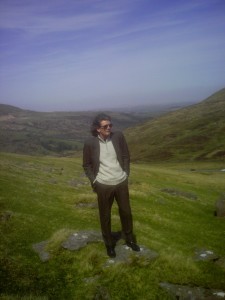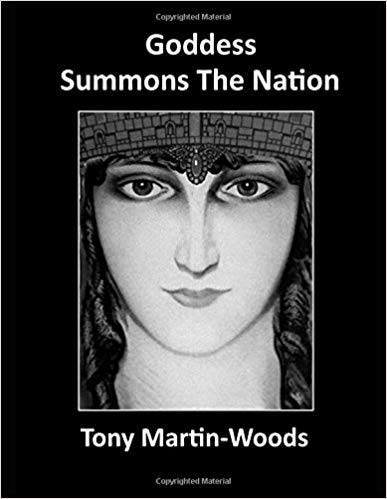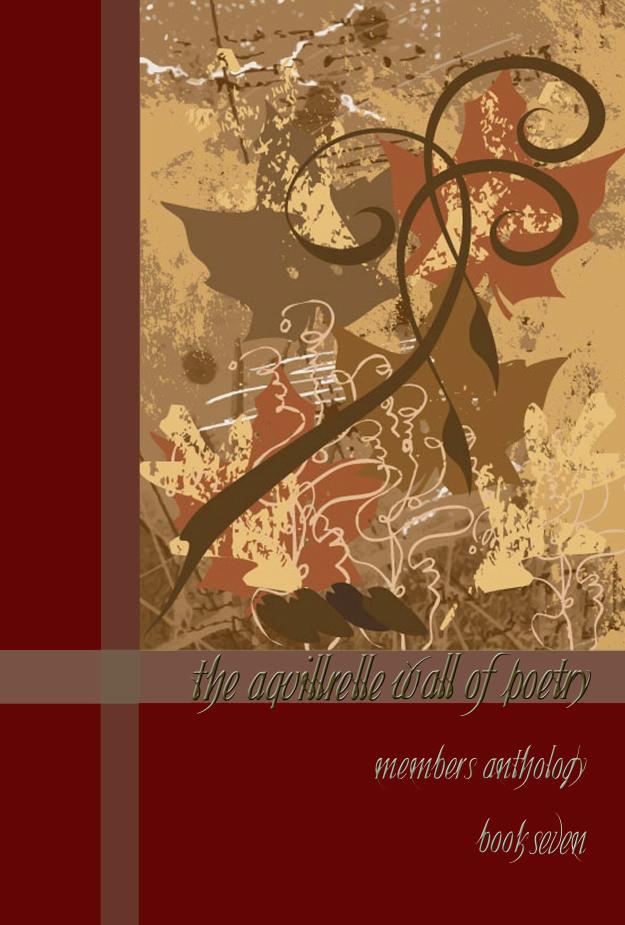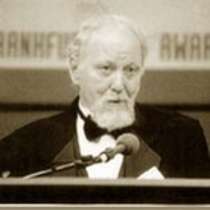Our societies are in deep crisis. The latest strand of the capitalist-nationalist virus is particularly aggressive: Brexit, Trump and various other ethno-populist movements across the Globe, disguised under democratic wrappings, represent a great danger for Humanity and Nature. Wars, discriminations of all types and poverty will only get worse in the New World Dis-order. In this book, Goddess opens proceedings and summons culprits, victims and heroes to make their case in poetic form: irony, joy, bitterness and hope come together through rhythmic directness and daring metaphors. The first book of the Goddess Series, Los viajes de Diosa (The Travels of Goddess), was published in 2015 in Spain and came as a response to the Great Recession. Tony Martin-Woods is an artivist who lives in England since 1995. He runs Transforming with Poetry at Inkwell, Leeds, and contributes to 100 Thousand Poets for Change. Under his Spanish name, he directs the digitisation project Poesía Ártemis and is the UK Delegate for Crátera, where he publishes translations into Spanish. His work has appeared in various anthologies and in Poetry Life and Times. https://www.amazon.co.uk. Goddess Summons Nation Tony Martin Woods by Antonio Martínez Arboleda (Author)
Excerpt from Goodess Summons the Nation. Editors Note: A visit via the link allows you a Look Inside to see the Table of Contents, available also on Kindle:
THE NIGHT OF TRUMP
I woke up suffocated
by the mare of the night.
I held my heart,
my breath,
and grabbed
my iPad:
I looked through the screen
like an agonising wizard
who casts
his eyes
on the hidden
guts
of a crystal
ball.
How many emotions,
how much attention,
could the map
of the States
withstand?
Never,
never
red and blue,
the numbers of colleges,
the random borders
of arbitrary plots
meant to me
what they meant that night:
an evil that no soul
will ever forgive,
a twilight that our dawn
will have to redeem.
T I M E TO LEAVE B R E X I T
I’ve never been an island,
Nor a chunk of it.
I could never be one
Cause I’m a social being
made of flesh
And emotions.
And so are you.
Cake it or Leave it:
We never were an island,
In fact there is no We
That anyone speaks for.
The sea is mainly a friend
An open road for all.
Storms are exceptions,
But national hyperventilation does not help.
Cake it or Leave it:
Our hearts are big enough
To cherish complex loyalties
Like we love mothers and fathers
And brothers and sisters
We can love England,
Yorkshire,
Britain,
Leeds
Europe,
London,
Spain
In an equal
Non-conflicting manner.
Cake it or Leave it.

www.leeds.ac.uk/arts/people/Spanish Portuguese and_Latin American Studies/Antonio Martinez Arboleda
Antonio Martínez Arboleda:
Tony Martin-Woods started to write poetry for the public in 2012, at the age of 43, driven by his political indignation. That same year he also set in motion Poesía Indignada, an online publication of political poetry. He runs the poetry evening Transforming with Poetry at Inkwell, in Leeds, and collaborates with 100 Thousands Poets for Change. Tony is also known in the UK for his work as an academic and educator under his real-life name, Antonio Martínez Arboleda. His project of digitisation of poetry, Ártemis, compiles more than 100 high quality videos of Spanish poets and other Open Educational Resources. http://www.artemispoesia.com/. He is the delegate in the UK of Crátera Revista de Críticay Poesía Contemporánea , where he also publishes his work as translator from English into Spanish. He published his first volume of poetry in Spanish, Los viajes de Diosa (The Travels of Goddess), in 2015, as a response to the Great Recession, particularly in Spain. His second book, Goddess Summons The Nation, is a critique of the ideas of nation and capitalism, mainly in the British Brexit context. It incorporates voices of culprits, victims and heroes with mordacity and rhythm. It consists of 21 poems, 18 of which are originally written in English. It is available in print and kindle in Amazon and other platforms.
Robin Ouzman Hislop is Editor of Poetry Life and Times his publications include All the Babble of the Souk and Cartoon Molecules collected poems and Key of Mist the recently published Tesserae translations from Spanish poets Guadalupe Grande and Carmen Crespo visit Aquillrelle.com/Author Robin Ouzman Hislop about author. See Robin performing his work Performance (University of Leeds)
Review
The Aquillrelle Wall of Poetry Members Anthology Book 7
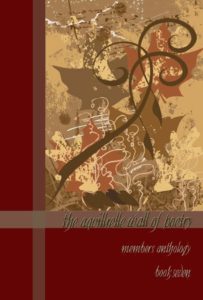
The Aquillrelle Wall of Poetry Members Anthology, book seven ©2018
Friends, poets,
Aquillrelle’s Anthology Wall7 is now released and published in both Ebook/PDF and Paper formats. It can be purchased on Lulu (and a couple of months from now also on Amazon, etc.).
Many thanks to the participants and to the supporters, it was hard yet gratifying work. Enjoy your (and your friends’) art!
The seventh wall. Some graffiti. Some works of art. Even some smudges included since they hold a message to be heard. Because this is the essence of every Aquillrelle wall – let everyone who values his/her word get a piece of the wall to themselves. You, the readers, are the beneficiaries. Read!
The poem included below is an excerpt from the above reviewed anthology
Elliptical Shift by Robin Ouzman Hislop
Meadows of wild flowers
sweet in an urban niche
framed by a hand of nostalgia
framed in an enclosure
for the price of pathos
riots of the human race
rampage across its space
in resistance, resentment
everywhere history obscures the view
an enigmatic phantom
it projects its rapacious plans onto tomorrow
McDonald’s signs, stewards of the planet, protein signifier
regularities merge into a wholeness
the news comes on, in a refrain of the same monotone
as if the world were made new again.
*
The darkest regions of the planet’s mind
the photon of a star in a formless moment
becomes an instance of a memory
as the desert invites the ripple
to a turbulence of refrain
a window frame constrains
its world view to all that follows on
as if it could choose between what’s real
what’s imaginary
such choices, shape our view
to the now, before an open future
*
sunset on the high street, traffic
vanishing into it like black dots
whizzing out of the blind, the zonk
plonk, disappearing into its shadow
dust of ages, its record
all the particles cascading
into the horizon’s viewpoint
all the bits, pieces in their parts
blowing on the horizon’s sunset
Time is not the shadow cast by the world
the world is the shadow cast by time
(excerpt from All the Babble of the Souk)
To order: http://www.lulu.com/shop/Aquillrelle/The Aquillrelle-Wall of Poetry Book Seven/paperback/
e-book: http://www.lulu.com/shop/Aquillrelle/The Aquillrelle Wall of Poetry Book Seven/ebook/
Robin Ouzman Hislop is Editor of Poetry Life and Times his publications include All the Babble of the Souk and Cartoon Molecules collected poems and Key of Mist the recently published Tesserae translations from Spanish poets Guadalupe Grande and Carmen Crespo visit Aquillrelle.com/Author Robin Ouzman Hislop about author. See Robin performing his work Performance (Leeds University) .
A Philosophy of Yard by Jack Kolkmeyer. Collected Poems Reviewed by Renee’ Drummond-Brown
A Philosophy of Yard
FORTE Publications #12
Ashmun Street Snapper Hill Monrovia, Liberia
ISBN-10: 0994534795 ISBN-13: 978-0994534798
A Philosophy of Yard by Jack Kolkmeyer takes an intimate look at poetic reflections of the past, present and future day in a philosophical manner. This book leaves the reader with an understanding of how we view ourselves and how one should grasp the universe by accepting all of the mysteries and magic that ultimately grounds us. Kolkmeyer’s book opens with a poem titled “Often as a child” (1) but ironically, the poem was written about the death of Kolkmeyer’s grandfather which took place in Cincinnati. While this poem invites the reader into the authors personal space it also stresses of the importance of a life-cycle from a child’s perspective. On the other hand the author’s theme poem “A Philosophy of Yard” (2) written in Delray Beach weaves magic of wonder as it relates to nature’s stones, plants, seeds, weeds and animals, thus allowing everything to grow and reorganize itself in due season. In this review of A Philosophy of Yard, I will weigh in on the contents and expound on the strengths and weaknesses of Kolkmeyers’ book. Therefore, buckle yourselves because A Philosophy of Yard will travel you from the “here” to the “there,” and brings the reader full circle back into one’s very own yard, while instructing you along the way.
The author strategically draws from poets; such as T. E. Hulme, Wallace Stevens and D. H. Lawrence using their unique metaphor style for place and implements it into the veins of his book. While the Beat Poets educated Kolkmeyer about meter and flow he skillfully mimics their style as well and weaves that throughout the book also. This author is no stranger to writing from the depths of his soul, while using inspirations from some of the great poets before his time. Kolkmeyer surrounds himself with knowledge of the African American culture as well, which gives the poetry within this book that rhythm and blues flare; adding literary renaissance to the messages that he conveys within his body of work.
Kolkmeyer’s poem “Coimbra Universidad” takes place in Coimbra, Portugal and figuratively points to D. H. Lawrence’s legendary writing style as Kolkmeyer opened the poem with “the sounding of a bitch bell” (106;1). The opening line is powerful, commands immediate attention and yet is definitely a controversial statement that can be viewed as offensive. Overall, the book has roots running deep in familial, providing clear imagery structured in a simplistic way. Yet, this erudite author manages skillfully to make one cogitate about the complexities of life along that path as it also relates to the human race. For example, in the poem “Everybody is Colored (a song)” (100) written in Santa Fe, the author masterfully tackles the race issue head on by addressing “everybody is colored/everybody’s got a mother/and a bag of white bones” (100;1-4).
Talk about iron sharpening iron; this author, shrewd and skillful understands the powerful effect of carefully placed line breaks in his poetry and uses them masterfully in creating genuine stanzas which ultimately stir emotions within the reader as seen in his poem “do doo wop” (95). This poem captures the Harlem Renaissance revolutionary explosion at its best and vibes with Langston Hughes’ poem “The Weary Blues” which evokes a tone of melancholy. While Kolkmeyer’s poem “doo doo wop” (95) has that very same disposition in these lines “Street corner colors fly/faintly yellow umber/surely some blues…shining from the muted lights/prying into the night life/a street corner prophet on his knee” (95;11-17) he manages to create originality and uniqueness in his poem thus causing it to stand up against Hughes’ masterpiece.
Kolkmeyer’s poem “Autumn” (4) and “The pod people” (6) both taking place in Delray Beach, can be compared to Robert Frosts’ poetic style, which often depicts relationships between nature imagery and humans. In the poem “Autumn” Kolkmeyer brilliantly captures the beauty of nature shared with humans as he wrote “we just wait with resignation knowing that winter is near…as we prepare a warmer spot/amidst the moves and rearrangements” (4;14-17). Whereas, in the poem “The pod people” he skillfully uses metaphors to capture that same effect within these lines “but we are in deed /the seed people/planting ourselves along furrows of time/seen differently from star to star” (6;6-9). Kolkmeyer deliberately takes the reader on another journey within these poems by shifting the reader’s mind into various periods as it relates to time which ultimately lends the authors instructions on embracing life.
Kolkmeyer’s poems “A New Seed (a song),” “Coltrane,” “Winter Solstice Winter Light,” and “To Wallace Stevens” reminds one of Frank O’Hara’s writings, while adding dimension of self-reflection and conscious control to otherwise permissive unpredictability. At times Kolkmeyer’s poetry reads like O’Hara’s and could be viewed as bluster of rants and even provocative. For example in the poem “Coltrane” Kolkmeyer skillfully rants “nocturnal admissions…lost arcs and frozen phrases/wholly wars of redemption/tangled transgressions…play deeply” (121;7-11) and then he follows it with a question of uncertainty “how deep is the ocean”(121;12). Nonetheless, it’s important to note that O’ Hara’s works are celebrated amongst the greatest, which further adds credibility to Kolkmeyer’s brilliant masterpiece. However, all the greats are subjected to criticism and Kolkmeyer is certainly no exception to the rule.
The author certainly captures home which takes place in Pittsburgh as he metaphorically points the reader back there within this poem “The Pittsburgh Boys” (66) in the following lines “lost in the hills and the valleys/jumpin’ the fences/riden’ trollies… crossin’ bridges… livin’/in a together place” (66;19-25). He further adds “we were Pittsburgh boys…still we are… we’ll keep going on/because of where we’re from” (67;7-13). “Kolkmeyer’s book is a labor of love that adds dimensions and challenges to one’s understanding as it relates to how we value ourselves and those closest to us. Kolkmeyer’s book can be compared to August Wilson’s incredible play Fences, because, like Wilson, the author describes how separated and yet connected families are throughout life as seen in this particular poem.
Furthermore, Kolkmeyer is unafraid to dig, sow and plant his poetic seeds into the grounds of richly fertilized soil, causing his literary prose and ethos to have great impact, which will influence how modern day writers approach their craft. This author’s voice is vibrant colorful, and distinctly powerful, which challenges the reader to also dig deep and wrestle analytically with the issues of life found in one’s own yard. I look forward not only this project, but, the transformation of Kolkmeyer, his growth and the poetic soul destined to become one of the 21st century greats.
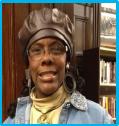
Renee’ Drummond-Brown, is an accomplished poetess with experience in creative writing. She is a graduate of Geneva College of Western Pennsylvania. Renee’ is still in pursuit of excellence towards her mark for higher education. She is working on her sixth book and has numerous works published globally which can be seen in cubm.org/news, KWEE Magazine, Leaves of Ink, Raven Cage Poetry and Prose Ezine, Realistic Poetry International, Scarlet Leaf Publishing House, SickLit Magazine, The Metro Gazette Publishing Company, Inc., Tuck, and Whispers Magazine just to name a few. Civil Rights Activist, Ms. Rutha Mae Harris, Original Freedom Singer of the Civil Rights Movement, was responsible for having Drummond-Brown’s very first poem published in the Metro Gazette Publishing Company, Inc., in Albany, GA. Renee’ also has poetry published in several anthologies and honorable mentions to her credit in various writing outlets. Renee’ won and/or placed in several poetry contests globally and her books are eligible for nomination for a Black Book award in Southampton County Virginia. She was Poet of the Month 2017, Winner in the Our Poetry Archives and prestigious Potpourri Poets/Artists Writing Community in the past year. She has even graced the cover of KWEE Magazine in the month of May, 2016. Her love for creative writing is undoubtedly displayed through her very unique style and her work solidifies her as a force to be reckoned with in the literary world of poetry. Renee’ is inspired by non-other than Dr. Maya Angelou, because of her, Renee’ posits “Still I write, I write, and I’ll write!”
EM Schorb Reviews Cartoon Molecules Collected Poems by Robin Ouzman Hislop
Cartoon Molecules is divided into six stoas, or porticos where, safe from the inclement weather of the outer world, the poet, thinking cap on, can walk like the peripatetic philosophers of ancient Greece, his readers following him about, absorbing the wisdom he is imparting, and occasionally, though sometimes without full comprehension, repeating it like rhapsodes. In short, the organization of the book invites one in, each stoa like a carnival tent, magical and intriguing to the starry-eyed reader. One pulls a flap and wonders, “What’s in here?” and is never disappointed. But at the same time. the ultimate subject of Mister Hislop’s extraordinary book is so large, so kaleidoscopic, that, in this reader’s opinion, to do it justice requires much more than a review. Like Joyce’s Finnegan’s Wake, it should have a skeleton key (as by Campbell and Robinson); like the universe, it should have a space traveller who can explore its endless depths. But don’t get me wrong. We get more than enough of magic and beauty when we just get some of it—like beautiful, unknowable life.
Take this sampler, a favorite of mine:
Dream of the machine
At the top of the stairs, perhaps she’s a person
in three persons traffic in her hair hums
life and intelligence a person
a fixed stair with a parading universe
machine intelligence a person
a ballooning moon
a universe in entelechy a person
or is she a simulation
a cartoon molecule in the dream of the machine
as long as she’s prisoner of an unknown
perhaps she’s a simulation
finite limits in a false eternity
voice of a world collapsing endlessly
a frozen world with only leaning things
lapsing crumbling without memory
a world at an end in frosted shadows that ride
in their depths a wilderness
could a machine swallow a universe
or a universe swallow a machine
at the top of the stairs the locusts come
in her hair the simulacrum
In this work Mister Hislop reaches for the ends of being and, I suppose, though he may not think it, ideal grace. Deep in this Hislop-simulated universe of the cartoon molecule that dances its jig throughout his space-time continuum, he searches, as in “Dream of the machine,” for what might be called electronic love. He sings the body electric at the top of the stairs. Who is she? What is she? Machine or woman; or some combination of the two? Is it possible for the reader to think of it/her as Grace, or at least, as “grace”? Mister Hislop seems to think of it/her both ways; but then, isn’t it pretty well accepted that there are multiple universes? Perhaps in one universe she is the one thing, and in another, another.
-
Is all that we see or seem
But a dream within a dream?
Aside from the centuries, Mister Poe and Mister Hislop are not so far apart, and, do you know, despite the objections that I expect from almost everyone, possibly including Mister Hislop, I say the two poets are partners in the exploration of the Universe. “Eureka,” cried Archimedes; Eureka, wrote Mister Poe; Eureka! Mister Hislop, fare thee well, as you explore the world of deep space.
Amazon.com Author Robin Ouzman Hislop
Aquillrelle.com/Author Robin Ouzman Hislop
E.M. Schorb
PRIZE-WINNING BOOKS
BY E.M. SCHORB
Books available at Amazon.com
_______________________________________
Dates and Dreams, Writer’s Digest International Self-
Published Book Award for Poetry, First Prize
Paradise Square, International eBook Award
Foundation, Grand Prize, Fiction, Frankfurt Book Fair
A Portable Chaos, The Eric Hoffer Award for Fiction,
First Prize
Murderer’s Day, Verna Emery Poetry Prize, Purdue
University Press
Time and Fevers, The Eric Hoffer Award for Poetry
and Writer’s Digest International Self-Published Book
Award for Poetry, each First Prize
edtor@artvilla.com
robin@artvilla.com
All the Babble of the Souk Reviewed by Richard Lloyd Cederberg
-
ALL THE BABBLE OF THE SOUK
A personal reaction/essay from:
Richard Lloyd Cederberg
________________________________________
Initially the title of the book puzzled me. ‘Babble’ and poetry seemed antithetic. But Robin’s usage of the title in the first poem – ‘Africa North’ -seemed to be hinting at something vaster in scope. “All the babble of the Souk, men over there, over there women. All the life of the planet, so little part of it that I breathe” This made it seem like a sweeping vision from a finite point of view. After reading various poems, I saw that the poet’s work was alive with surreal vignettes; visual snippets patched together to create a montage of life’s mysteries, colors, and characters. This particular observation was supported (I felt) in a verse from ‘Lucky Hat Day’. “The world is a patchwork quilt, stitched up to the hilt its seams, which we quarter in our dreams, on which our edifice is built.”
Soren Kierkegaard said: “The poet can understand everything, in riddles, and wonderfully explain everything, in riddles, but he cannot understand himself, or understand that he himself is a riddle.” At that point I knew that attempting to dissect the poet’s work in a grand intellectual context was the wrong approach. Besides, I wasn’t qualified. Instead I would read it as if I was sitting under a waterfall and offer back the stimulating way the content was washing over me. First and foremost… I purposed for a better grasp of the title. Something that made sense to me. With that I felt I would have a better chance at apprehending the contents. So that’s where it began.
Book titles, for me, are kinda’ like figureheads on the prows of wooden sailing vessels; a face on it, but not the power of it. This title seemed to be corroborating all the chaos and noise humanity makes living their lives and hawking their philosophies and products in a global marketplace. Certainly this obvious interpretation had some merit, but it didn’t seem (to me) to affirm the books ultimate scope. Still curious; I dug into the definitions and discovered something intriguing. There was one definition that stood apart and became a key that started a trickle of water for me.
BABBLE as an intransitive verb: to talk enthusiastically or excessively. To utter meaningless or unintelligible sounds. To make sounds as though babbling. As a transitive verb: To utter in an incoherently or meaninglessly repetitious manner. To reveal by talk that is too free.
SOUK… a marketplace in North Africa or the Middle East.
A fuller definition: A marketplace in North Africa or the Middle East.
A bazaar. Also: a stall in such a marketplace. It became personal here.
STALL… A small area set off by walls for a special use. A booth where articles are displayed for sale. The water began to flow stronger now.
The Poet’s Stall. You can call it whatever you want but each of us has one. Mind. The seat of the faculty of reason. The poet’s singularity of cogitation. Senses. Telescope. Microscope. Binoculars. Tools. Oxymoron. Pun. Idiom. Simile. Onomatopoeia. Hyperbole. Alliteration. Personification. Metaphor. A verse from ‘The Pine at the Summit’ offered a glimpse into the process. “My mind’s a needle scratching sky, bleeding a sigh of shadow, as through tension of this extension, I summit into ascension.”
All poets require a safe [set apart] place they can enter to assimilate and interpret the world around them. A place where they can observe the mysterious vastness of life without being overwhelmed by it. I could visualize, then, a place set apart in the midst of a noisy-plagued-global-marketplace, where the poet could readily analyze, understand, and express the essential (and non-essential) elements of all that was being observed and felt; locally, from his travels, and in a broader global context. Robin’s poetry found the cracks in my defenses then and began hydrating me. Each reading, after that; the content became more meaningful.
As someone once said: “It requires wisdom to understand wisdom; the music is nothing if the audience is deaf.” Many say that poetry is an [almost] dead art form. I’m not so sure about that now.
For me personally: the essence of profound insight is simplicity. If poets only cater to poets then a part of the ‘souk’ is deprived. Some say poetry is painting with the gift of speech. If this is true, and I believe it is, then Robin’s work, to me, evokes, M.C. Escher, Robert Raushenberg, and perhaps (at times) even Salvador Dali. Readers take caution. Robin is a poet’s poet. A reasoning philosopher who sees life vastly different than most, and, who channels much of what he sees and feels into his work.
“As he affirms in ‘Clear Drops of Water’: “To write is my possession – a given time, a given space, a given self, as if it were an alchemy that could turn blood into wine, we’ve different tastes nature or me.”
‘All the Babble of the Souk’ is not simple. It is woven with riddles that, when resolved, offer the reader a singular critique of life from a safe perspective. Robin’s poetry may never be fully grasped by me. It is esoteric. Intriguing. Surreal. Adventurous. Philosophic. Brainy. But even though it demands carefully considered thought to fathom; it still flows as pure water in its declarations, imagery, and suggestions. Poet Hislop’s unique work has heightened my appreciation for the written word.
1. I am once again thankful for the depth, beauty, and mysteries of another’s poetic invention.
2. I discovered another beautiful view of the One Tree.
3. I have purposed now to get out of myself (more often) to discover another’s perspective; something quite essential for the poet and creative writer I’m thinking.
4. I can see an aspect of metaphor now that I’ve never known.
5. Poetry is NOT dead.
JEG HILSER DEG Robin Ouzman Hislop
Richard Lloyd Cederberg
Author/Poet
August 2007 Richard was nominated for a 2008 PUSHCART PRIZE. Richard was awarded 2007 BEST NEW FICTION at CST for his first three novels and also 2006 WRITER OF THE YEAR @thewritingforum.net … Richard has been a featured Poet on Poetry Life and Times Aug/Sept 2008, Jan 2013, Aug 2013, and Oct 2013 and has been published in varied anthologies, compendiums, and e-zines. Richard’s literary work is currently in over 35,000 data bases and outlets. Richard’s novels include: A Monumental Journey… In Search of the First Tribe… The Underground River… Beyond Understanding. A new novel, Between the Cracks, was completed March 2014 and will be available summer 2014.
Richard has been privileged to travel extensively throughout the USA, the provinces of British Columbia, Manitoba, Alberta, and Saskatchewan in Canada, the Yukon Territories, Kodiak Island, Ketchikan, Juneau, Skagway, Sitka, Petersburg, Glacier Bay, in Alaska, the Azorean Archipelagoes, and throughout Germany, Switzerland, Spain, and Holland… Richard and his wife, Michele, have been avid adventurers and, when time permits, still enjoy exploring the Laguna Mountains, the Cuyamaca Mountains, the High Deserts in Southern California, the Eastern Sierra’s, the Dixie National Forest, the Northern California and Southern Oregon coastlines, and the “Four Corners” region of the United States.
Richard designed, constructed, and operated a MIDI Digital Recording Studio – TAYLOR and GRACE – from 1995 – 2002. For seven years he diligently fulfilled his own musical visions and those of others. Richard personally composed, and multi-track recorded, over 500 compositions during this time and has two completed CD’s to his personal credit: WHAT LOVE HAS DONE and THE PATH. Both albums were mixed and mastered by Steve Wetherbee, founder of Golden Track Studios in San Diego, California.
Richard retired from music after performing professionally for fifteen years and seven years of recording studio explorations. He works, now, at one of San Diego’s premier historical sites, as a Superintendent. Richard is also a carpenter and a collector of classic books, and books long out of print.
www.facebook.com/PoetryLifeTimes
www.facebook.com/Artvilla.com
robin@artvilla.com
editor@artvilla.com
goodreads.com/author/show/Robin Ouzman Hislop
http://www.aquillrelle.com/authorrobin.htm
http://www.amazon.com. All the Babble of the Souk. Robin Ouzman Hislop
www.lulu.com. All the Babble of the Souk. Robin Ouzman Hislop
https://www.amazon.com/author/robinouzmanhislop
http://www.innerchildpress.com/robin-ouzman-hislop.All the Babble of the Souk
Adam Levon Brown Review
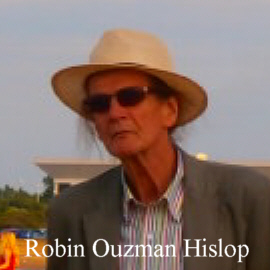
4/5 Stars
Review of All The Babble of the Souk
By Robin Ouzman Hislop
I had the great pleasure of reviewing “All the Babble of the Souk” by a very experienced and talented poet, Robin Ouzman Hislop.
The book is split into the two parts, The first part is “All the Babble and the Souk 1” and is very short in comparison to the second part, “All the Babble and the Souk 2”.
Reader beware, this poet is on a different level. Do not read this if you don’t want to engage your essence in a series of fantastic life/mind changing events. Many of the poems herein push the boundaries between science and philosophy and develop a sense of doubt within the reader. These poems carry you on a cosmological, philosophical journey that is sure to leave you speechless and thinking on deeper frequencies.
Part 1
These are just a few of my favorites from part one.
From the very start with the poem “Africa North,” Hislop captures the reader in a vivid description of a thriving cityscape filled with many sensuous sensations. The poem “Passage” is a psychological view into the mind of the modern human. The poem, “Non Linear” focuses on the inception of homo Sapiens and how the system we created dwarfs us into a microcosm of everything around us.
Part 2
The second part is filled to the brim with intellectually stimulating pieces that deserve at least a second read through. The poem “Accident” grasped me and made me think of past events that I thought were lost forever.
The poem, “Slant” is written in sections such as, “on the Bus” and details philosophical messages the author has gained through these experiences. I very much enjoyed this poem as it is raw, delves deep into the mind of the poet and presents the inner workings of the brain.
The poem, “Edge” touches on what I believe is our greatest political and existential battle; human extinction.
Conclusion
This book changed my perspective on the human experience. Highly recommended to anyone who is into philosophy and isn’t afraid to take a step in a different direction.
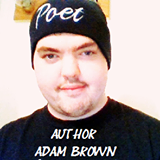
Adam Levon Brown is a poet and author residing in Eugene, Oregon. He has one published poetry book out, Musings of a Madman, which is a collection of poems made to enlighten and inspire the reader. Adam attributes his love of poetry to the many great poets he discovered in the school library during his formative years. He enjoys listening to political hip hop music and is a political activist himself.
My Author Page: www.ctupublishinggroup.com/adam-levon-brown-.html
My Facebook Author Page: www.facebook.com/AuthorAdamBrown
My Twitter Account: twitter.com/adamlevonbrown
www.facebook.com/PoetryLifeTimes
www.facebook.com/Artvilla.com
robin@artvilla.com
editor@artvilla.com
goodreads.com/author/show/Robin Ouzman Hislop
http://www.aquillrelle.com/authorrobin.htm
http://www.amazon.com. All the Babble of the Souk. Robin Ouzman Hislop
www.lulu.com. All the Babble of the Souk. Robin Ouzman Hislop
https://www.amazon.com/author/robinouzmanhislop